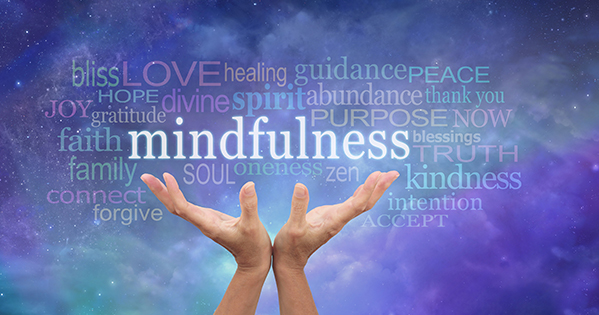
Mindfulness has been a buzzword lately. It means being in the present moment – noticing where you are, what’s around you and what you’re feeling. It’s being aware of what’s right here, right now without judgment, without wishing it were different in some big or small way.
I’m going to show you how mindfulness applies to relationships, but first let’s start with some examples of the opposite of mindfulness. Not being mindful would be thinking about (and perhaps, regretting) the past or planning (and perhaps, anxious about) the future. You might be staying in the present, but instead of taking it for what it is, be caught up in your own narrative (or the meaning you make of) the present event. It can be a distraction, only half paying attention or wishing this moment was over to get to the next moment. Pause to consider how often you may do that last one. It could be begrudgingly loading the dishwasher so you can ‘get to’ sitting on the couch, or wishing you weren’t standing on line and you were already at the counter or watching the clock at work so you can ‘get to’ the end of the day. All these are examples of ways we can individually not be mindful.
In my work with couples, I’ve expanded the concept of mindfulness to apply to relationships. It’s an advanced concept because it stretches people not only to be present in the moment with their partner but to do so without judgment of one’s partner. Judgment here means longing for them or the situation to be different in some big or small way.
One type of the opposite of mindfulness in relationships is wishing your partner was different in behavior or character. Here are some examples: You and your partner are sitting on the back deck sipping wine together but you’re wishing he/she would talk more. You and your partner are texting while at work and you wish he/she would send you loving/sexy texts without being prompted. You’re affectionate and like having sex but dislike that it only happens if you initiate. Your partner makes a nice dinner but burns the garlic bread. You think your partner works too much, talks too much, eats too much, and so on. All these are examples of wanting him/her to be/do something else than they are presently doing.
Another type of the opposite of mindfulness in relationships is being caught up in your own narrative, or your interpretation of the present event. Here are examples of this: Your partner says they don’t have time today to investigate a billing error you found and you say to yourself “She never makes time for things that take effort.” Your partner forgets something important you told her and you say to yourself “She never pays attention when I tell her something.” Your partner is out for the evening and doesn’t return your text and you say to yourself “I wonder who she’s really with.” All these are examples of not taking what your partner is saying or doing at face value, but instead allowing your thinking to layer on a story, or narrative, over it. Often, this thinking comes from past occurrences (you’re bringing the past into the present moment) or from future concerns (bringing the future into the present moment).
What if you could be in the present moment in interactions with your partner without judgment and without bringing in the past or future? It would mean you’re accepting of him/her as they are right now – an imperfect human being (as we all are). You would be aware of, and okay with, what IS occurring rather than what (according to you) SHOULD BE occurring. This is, of course, excluding abuse. I’m not implying you should be okay with being abused. Putting that aside, mindfulness in relationships would mean noticing what your partner is doing or saying right here and right now and being at peace with it. You would feel centered and calm with the current reality because you are no longer wrestling against it (either silently or aloud). This would require you to find your center and your sense of peace in order to handle what life (and your partner) presents in that moment. In other words, if you are able to say calm and focused in the present, it will be easier to accept your partner’s actions or words, simply for what they are.
It’s important to remember that being mindful does not negate that you still may have specific needs you would like your partner to meet. You can still make requests of your partner. The purpose of marriage is to grow into our best selves and (if we’re not too highly defended) our partner can be our best critic because they know us very well and still love us. You can both continue to ask for what you’re needing and wanting, but the key is to be okay if your partner cannot, or is not yet ready to, give that. They might be ready in the future, but for now, you can be in the present moment with him/her without judgment. Think of what a gift this would be to your relationship – to love and accept one another as we are now. It’s what we’re all longing for as humans – to be known and, despite having faults, still loved.
<

